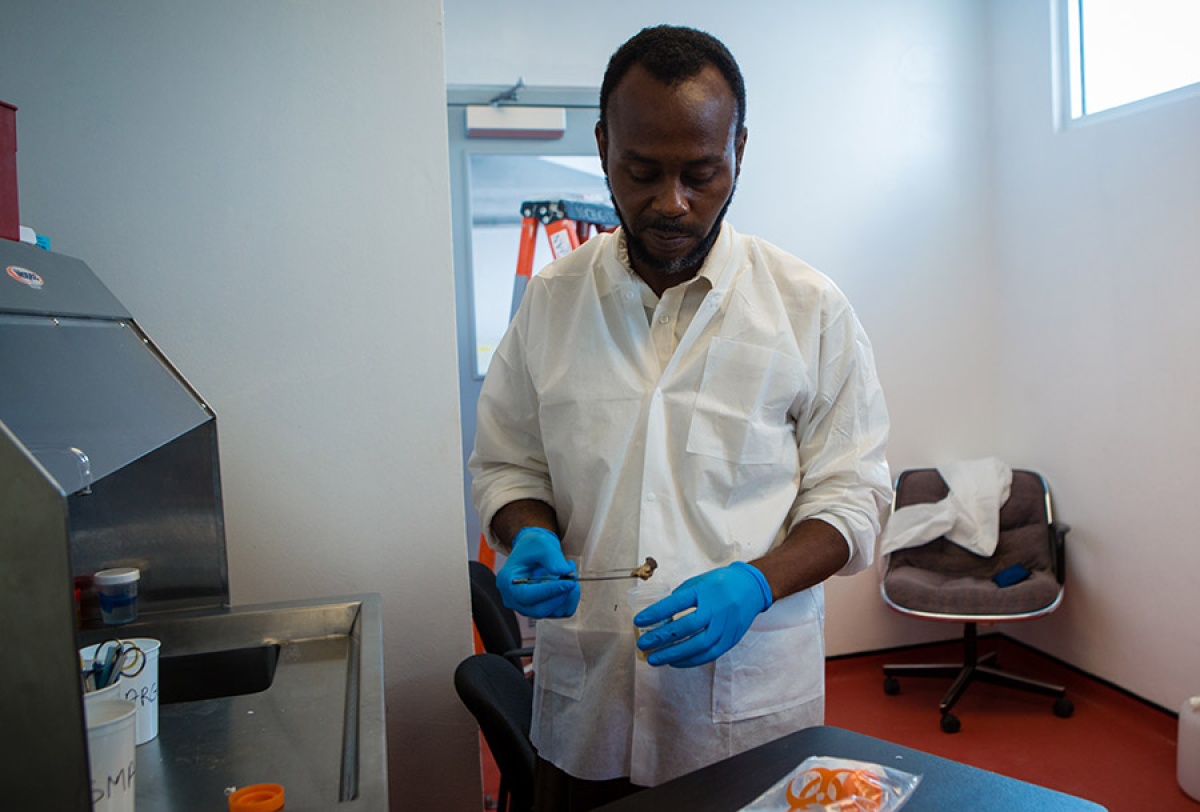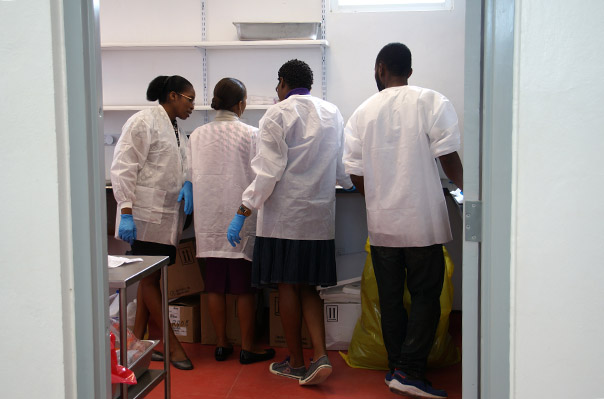Haiti's New Pathology Lab Accelerates Cancer Diagnosis
Posted on Dec 23, 2016

Inside a whitewashed room the size of a generous walk-in closet, three Partners In Health laboratory technicians and a pathologist meticulously slice tissue samples and embed them in paraffin. They are the first employees to christen the new pathology section in the Mirebalais Regional Reference Laboratory.
To outside observers, their work may seem tedious. But to cancer patients, it’s lifesaving.
The paraffin cassettes are no larger than a stick of gum and travel easily to Boston, where volunteer pathologists analyze them and send their diagnoses to PIH oncology staff at the University Hospital in Mirebalais, Haiti. Before the pathology section opened in October, patients waited 90 days for a diagnosis. Now, they get one in 20.
“It’s a paradigm shift having pathology services outside of Port-au-Prince and, soon, being able to do all processing of biopsies onsite,” says Daniel Orozco, PIH’s director of laboratory services.
Pathology is the first section to open in the two-story, 15,800-square-foot regional reference laboratory. The facility—built in partnership with Build Health International, a Massachusetts-based construction company, and Haiti’s Ministry of Public Health and Population—will eventually house sections devoted to parasitology, chemistry, immunoserology, hematology, and both medium- and high-level containment labs (BSL-2 and BSL-3) for microbiology and mycobacteriology.
Patients aren’t the only ones benefitting from the new lab; staff with Zanmi Lasante, as PIH is known in Haiti, have gained specialized skills and learned to use state-of-the-art technology.
“I love the new intellectual challenge,” says Myrléne Mompremier, who used to work as a general lab tech in PIH’s clinic in Boucan Carré. Now, she takes pride in her promotion to histopathology technician.
Opening the pathology section first was essential given the number of oncology-related biopsies University Hospital surgeons perform. There were almost 2,000 last year alone, most of them for breast cancer.
Biopsies used to go directly to PIH’s partner institutions, including Brigham & Women’s Hospital, the Dana Farber Cancer Institute, and Newton-Wellesley Hospital. Now, instead of traveling 1,600 miles from Mirebalais to Boston, tissue samples are walked 100 yards across campus from University Hospital to the regional reference laboratory. PIH pathologist Dr. Fabienne Anglade and her three technicians, each of which had several weeks of on-the-job training from visiting Boston pathology technicians, receive the samples in their new workspace.
 |
| PIH pathologist Dr. Fabienne Anglade (center-left) trains histopathology technicians Chantalé Bellévue (from left), Myrléne Mompremier, and Lagrénade, who came from different PIH labs to work in the new pathology section. (Photo by Lauren Greenberg / Partners In Health) |
Together, they process 100 tissue samples every month from University Hospital’s surgery and oncology departments. Each specimen arrives with a label bearing the patient’s name, age, and file number. The tissue is sliced and separated according to doctor’s orders, then embedded in paraffin within one of three processing machines in an adjoining room.
“Surgery is all about timing,” says Dr. Michelson Padovany, a University Hospital surgeon who specializes in oncology. “With the pathology lab, we can reduce the time to have results and give better care. You can also do more surgeries.” As many as 2,000 more, he estimates.
Chantalé Bellévue, one of the histopathology technicians, is proud to help provide cancer patients with quicker diagnoses.
So is her colleague Prophete Lagrénade. “With this new service, we will contribute to improving the quality of life and economic condition of our patients,” he says. Like Bellévue, he worked in a University Hospital general laboratory before transferring to the new facility.
Next year, Orozco hopes to have an imaging system installed so technicians can email digital snapshots of prepared samples to Boston for diagnosis, cutting wait time even further. It’s no far-fetched dream. PIH is already doing the same in Rwanda.
Meanwhile, other areas of the research lab receive final touches. Down the hall from the pathology section, Orozco prepares for the opening of the high-level containment (BSL-3) laboratory, which will be used to study and diagnose airborne infectious diseases, such as tuberculosis. He points around an empty suite that will soon be filled with ventilation hoods, automated instruments, lab benches, and other accoutrement necessary for the high-tech facility—all donated by the U.S. Centers for Disease Control and Prevention.
Once this section opens in spring 2017, it will be the only BSL-3 lab outside of Port-au-Prince, and one of few in the Caribbean focused on diagnosing tuberculosis and multidrug-resistant TB.

